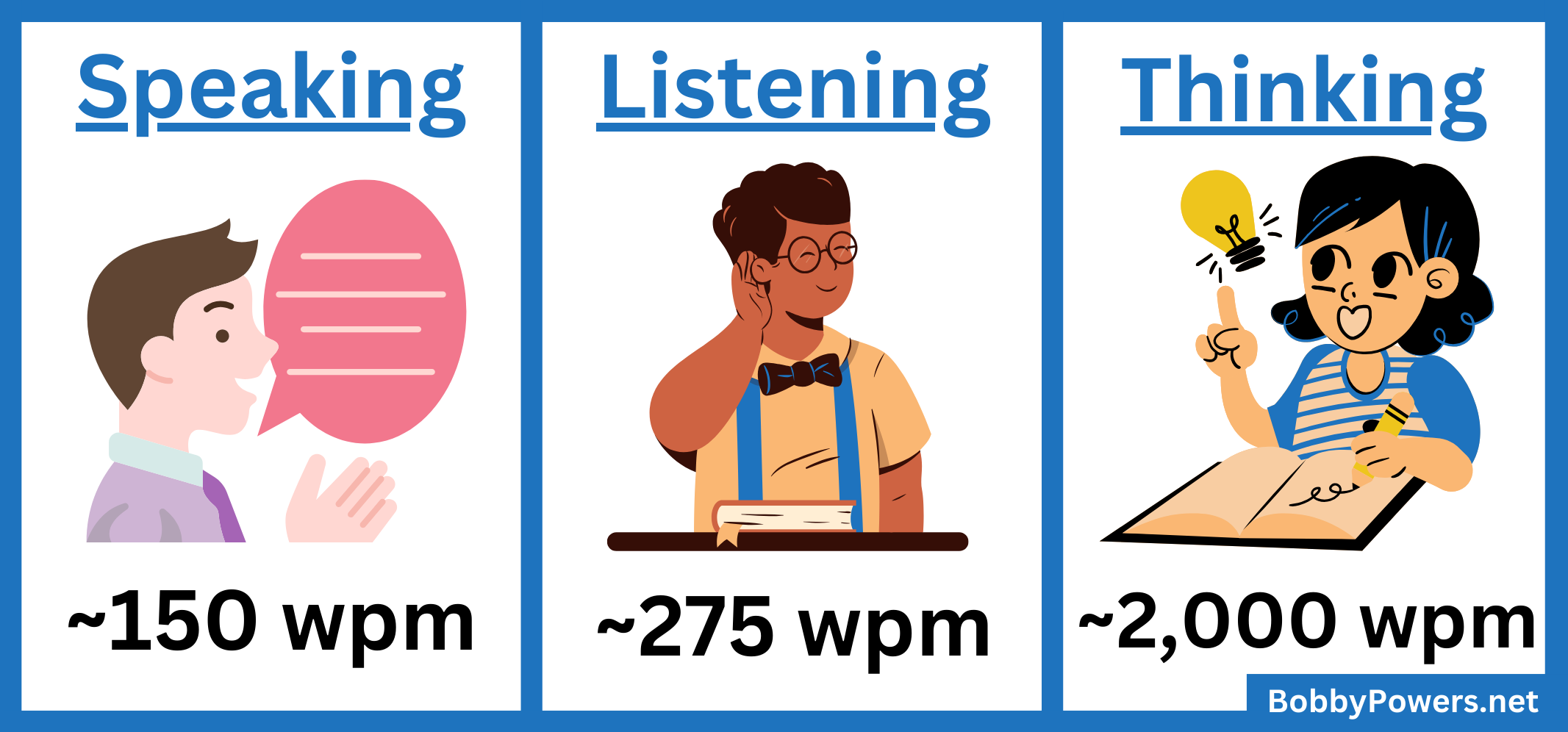What Makes Listening So Difficult (and What Can We Do About It)?
One of my biggest pet peeves is when people multitask on Zoom calls.
A previous CEO I worked with (“Jacob”) was one of the worst offenders. He’d pound away on his computer during the entire meeting, then ask a question showing he’d missed the past five minutes of discussion.
Eventually, I talked to Jacob about this behavior and asked him why he saw the need to send emails during meetings. His answer surprised me.
I expected him to say he multitasked because he had so much to do, but instead, he said, “I just get bored. I need to do something else because I can’t stand to listen to someone talking at a slow pace. I even listen to podcasts at 200 percent speed because otherwise, I lose focus.”
Jacob said this as a badge of honor—pleased that he could comprehend podcasters like Tim Ferriss or Joe Rogan speaking at squirrel speeds.
Our entertainment-driven, dopamine-addicted, never-bored society has made listening harder than ever.
But Jacob’s comment left a bad taste in my mouth, causing me to wonder what’s happening to our modern-day attention spans.
Our Attention Spans Are Shrinking
Average attention spans have dropped precipitously in the past several decades, according to researchers like Gloria Mark, PhD. Mark began measuring attention spans in 2004, when she found an average attention span of around 150 seconds.
But what’s scary is that her most recent research shows the average human’s attention span is only 47 seconds—a drop of 69 percent.
In a world of social media doom-scrolling, thousands of instantly streaming TV shows and movies, and 24/7 news coverage, it’s no wonder our attention spans have plummeted. (The next time you have a conversation with someone, pay attention to how many times they check their phone or Apple Watch.)
Information, entertainment, and distractions are coming at us faster than ever, damaging our ability to pay attention to anyone or anything.
Back in 1971, psychologist and Nobel laureate Herbert Simon wrote these prophetic words (emphasis mine):
“In an information-rich world, the wealth of information means a dearth of something else: a scarcity of whatever it is that information consumes. What information consumes is rather obvious: it consumes the attention of its recipients. Hence a wealth of information creates a poverty of attention.”
Our entertainment-driven, dopamine-addicted, never-bored society has made listening harder than ever. And unfortunately, it was already hard to begin with. One reason for that comes down to limiting factors of human biology.
As it turns out, our brains can move much faster than most people speak. Studies show most people speak at a rate of roughly 150 words per minute (wpm). But we can listen at up to 275 wpm and think at roughly 2,000 wpm.

- We tend to get bored quickly while listening because our brains can handle much more stimulus than the 150 wpm someone speaks.
- We fill that time with other thoughts — considering how we’ll respond, what we want for lunch, or when we want to leave work for our kids’ baseball game.
- Because we end up thinking about other things, we miss valuable information. And, even more importantly, the other person can often tell we’re not paying attention.
Note: Data points like this are difficult to measure, so you’ll find slight differences based on which studies you review. But directionally, you get the idea: our brains can process WAY more than just the words someone is speaking.
So…What Can We Do About It?
There’s a lot of trite listening advice out there like don’t interrupt people, repeat back what the other person said, and other tips we’ve all heard a hundred times.
Here are three novel tips you can use to become an empathetic listener:
1. Count how many times you “assist” versus “steal”
The next time you have a conversation with someone, count how many times you give them an assist compared to how many times you steal the conversation away from them:
- Assist: Keep the spotlight on the speaker (ask them questions, encourage them to continue sharing, etc.)
- Steal: Redirect the spotlight to yourself (share a story about yourself, pivot to a topic you’d prefer to discuss, etc.)
Seriously, keep track. I dare you. It’s illuminating to see how selfish we can be in conversations. In most conversations, you should aim for a ratio greater than 2:1 assisting to stealing.
It’s natural in any conversation to have a give and take: they share for a while, then you share. But it’s problematic if you spend too much time hogging the spotlight.
2. Be mindful of your “story-stealing” motivators
Each of us has reasons that prompt us to stop listening and jump in to share something of our own. I’ve found there are three common motivations behind most reasons for jumping in to say something:
- Excitement/Passion: You can’t wait to share something that excites you.
- Ego/Knowledge: You want to pass along something interesting that connects to the current topic (a book, quote, story, etc.).
- Encouragement/Advice: You want to help the other person.
As you can see, our motivations for sharing something are often positive. But if we jump in too frequently, we become selfish conversationalists.
Reflect on which of the three reasons above causes you to interrupt others or steal the spotlight from them. Once you’re mindful of what prevents you from attentive listening, you can better mitigate its impact.
3. Listen with your eyes
The best listeners listen with more than just their ears. Their entire body is involved in listening to the other person.
They lean in. They tune out everything else. They make eye contact to show they’re paying attention. They watch for nonverbal cues that indicate what the person is feeling (not just what they’re saying).
Whenever you talk to someone, do them the service of listening with more than just your ears.
In today’s fast-paced, distraction-filled world, listening is harder than ever. But it’s definitely not impossible.
If you can resist multi-tasking, focus on assisting more than stealing, avoid story-stealing, and listen with more than just your ears, you can become a more empathetic listener and help the other person feel truly heard.
Want to become a stronger leader?
Sign up to get my exclusive
10-page guide for leaders and learners.




